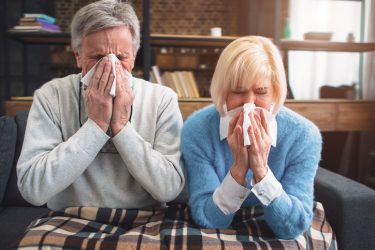Pneumonia in the elderly – What caregivers can do to prevent it

The weather has gotten colder!
And even though we don’t get snow like most of the East Coast, we’re experiencing our share of cold weather.
As a caregiver, it’s important to be prepared for this weather as well as watch out for any cold-related illnesses like pneumonia.
Adults over the age of 65 are more likely to get pneumonia.
The good news is that, it can be prevented.
In fact, the United States Centers for Disease Control (CDC) recommends two pneumococcal vaccines for adults older than 65.
CDC’s suggestions are to:
- Get a dose of the pneumococcal conjugate vaccine (PCV13) first. Then get a dose of the pneumococcal polysaccharide vaccine (PPSV23) at least 1 year later.
- If you’ve already received PPSV23, get PCV13 at least 1 year after receipt of the most recent PPSV23 dose.
- If you’ve already received a dose of PCV13 at a younger age, CDC does not recommend another dose.
In today’s post, we’ll take a look at what you can to do prevent pneumonia.
Pneumonia in the elderly
Pneumonia is an infection of the lungs that is caused by various micro-organisms including pneumococcal bacteria and the influenza virus.
The micro-organisms are more likely in thrive in an immune-compromised system.
When a person has a comprised immune system, they are not able to fight off infections easily. In those instances, any bacteria or virus present begin to multiply vigorously and this ends up in disease.
One of the environmental factors that can compromise a person’s immune system is the cold weather outside.
And when you add other risk factors such as age and other pre-existing health conditions, pneumonia becomes a scary prospect.
Thus as a caregiver, it is important for you to be on the look out for your loved one so that you can prevent it.
Steps to prevent pneumonia this season
- Make sure your loved one is up-to-date on their vaccines for pneumonia and influenza. As I mentioned above, the CDC recommends it for people above the age of 65.
- Make sure your loved one has warm clothes to wear during the colder parts of the day.
- Cigarettes and cigarette smoke contributes to pneumonia. Thus, it’s important to stay away from cigarette smoke or encourage your loved one to quit smoking.
- Ensure that heating is working in your loved one’s home. In San Diego, the nice weather makes most of us forget about heating for our homes. However, it’s important during the colder months. A space heater can be a temporary solution but the sooner you are able to provide heating for your loved one, the better.
- Other people are sick during this season, wash your hands regularly if you will be around anyone who is sick.
- If your loved one has on-going medical issues such as asthma, diabetes or heart disease, it is important to manage it properly. These existing medical conditions can compromise the immune system and contribute to severe pneumonia.
Pneumonia in the elderly is serious enough that the CDC has recommendations regarding it.
Thus as a caregiver, you cannot take it lightly. Taking the steps I’ve outlined above will help your loved one stay healthy this season and will ultimately save you and your family from needless medical costs.
Did you find this post on pneumonia in the elderly helpful?
Make sure to spread the word!
